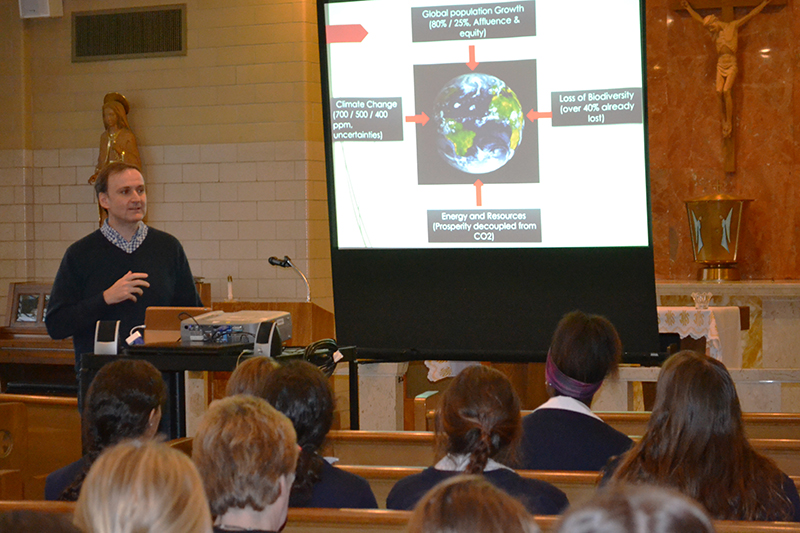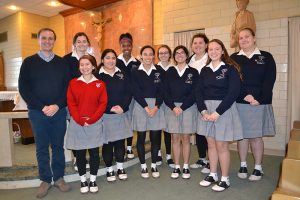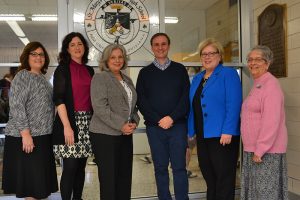‘Pope’s Climatologist Shares Research and Insights during Visit to St. Mary’s Dominican High School’

In his visit this week to New Orleans where he attended the American Meteorological Society (AMS) annual meeting , the world’s largest yearly gathering for the weather, water, and climate community, Fr. Eduardo Andres Agosta Scarel , O.Carm., Ph.D. visited St. Mary’s Dominican High School where he shared research and insights with students, faculty and staff in his presentation, “Climate Change and the Care of the Poor and Nature.”

Called Pope Francis’ Climatologist, Fr. Eduardo is on the faculty at the Argentine Pontifical Catholic University’s School of Sciences and Engineering. He holds a Ph.D. in Atmospheric and Oceanic Sciences from the Buenos Aires State University and has done extensive research on the climate and climate change. In addition to his scientific work, he reflects on the relationship between science and faith, and between spirituality and ecology. Since 2008 he has been a member of the International Commission of Justice, Peace and Integrity of Creation of the Carmelite Order (Rome), and is a consultant to the Earth, Society and Environment Pastoral Section in the Latin American Council of Catholic Bishops (Bogotá). He also is a member of the Coordinating Team of the Carmelite Non Government Organization (New York) and its representative at the United Nations Framework Convention on Climate Change.

As an Argentinean priest, he was friends with the former Archbishop Bergoglio of Buenos Aires, Argentina (now Pope Francis) and worked with him on environmental issues. Fr. Eduardo was involved with preparatory consultations on the Pope’s encyclical letter, Laudato Si’: On the Care of Our Common Home. Pope Francis chose as his namesake Francis of Assisi, the patron saint of animals, saying the saint’s values reflected his own.
“The scientific evidence is now overwhelming and shows that the present Earth climate is warming and that in many regions, the local climates have changed significantly,” Fr. Eduardo noted. “We have concluded that human activity is largely responsible for this change through emissions of greenhouse gases.”
He warned that if we fail to strongly reduce greenhouse-gas emissions and to bend the warming curve, “we, our neighbors and children will be exposed to intolerable risks. We must note that the bigger issue, rather than the amplitude of the warming in the future, is the speed of the process.”
The encyclical, published June 18, 2015, is a pastoral call to change the way people use the planet’s resources to ensure they will meet future generations’ needs. It is not a technical guide on how to allocate user rights for the atmosphere. Fr. Eduardo credits Pope Francis as “shedding more light upon the ethical dimension of the ecological problem and providing us with fundamental principles to be applied for solutions.
“One of the Pope’s messages is slow down the pace of our consumption. Our pace is not sustainable. We have to change not only in technology and energy, but also in our options as consumers on our planet. Eighty percent of Earth resources are consumed by only 20 percent of the population.”
The encyclical offers four fundamental principles to take action: the preferential option for the poor, the most vulnerable to our global actions against nature; inter- and intra-generational justice – “What kind of world do we want to leave for those who come after us?”; the common, but differentiated responsibility among the nations (We are all in charge of looking for solutions, but not evenly responsible); and orientation to the common good in order to preserve nature and guarantee social justice.
“Pope Francis is a joyful believer in human dignity and our creative ability to meet immense challenges,” said Fr. Eduardo. “He has hope. More importantly, he trusts in God’s help and in human beings’ ability to use their reason to meet challenges.”
In addition to speaking at Dominican, Fr. Eduardo spoke at Mount Carmel Academy, and to the New Orleans Archdiocese Brothers, Sisters and Priests.
(Photos by St. Mary’s Dominican High School)
 USA
USA


